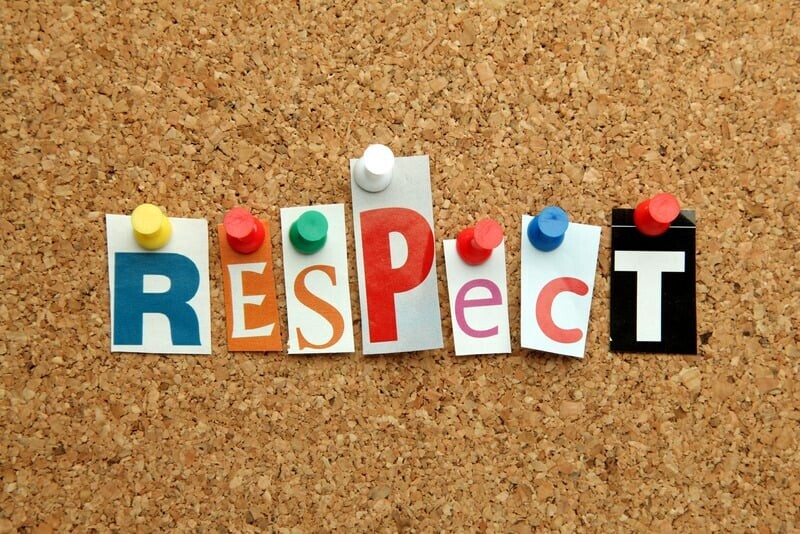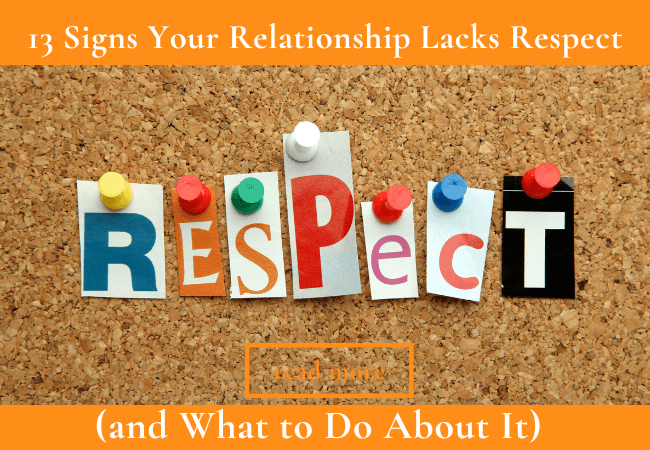
Is your relationship suffering from a lack of respect? Learn the 13 clear signs to watch for. They affect your emotional health. Take steps to regain balance.
Respect is vital to any healthy relationship. Yet, many stay in situations needing it. This causes emotional strain. Recent studies show that a lack of mutual respect is the main reason relationships end. The Gottman Institute found that contempt is a top predictor of divorce. Disrespect arises mainly from contempt. With U.S. divorce rates at 40-50%, respect is critical to success in relationships. It’s often overlooked.
Your Relationship Lacks Respect (and What to Do About It)
Disrespect in a relationship can be subtle and complex to recognize at first. It might start with dismissive comments or thoughtless actions. But, over time, these small behaviors can erode the core of your connection with your partner. Ignoring these signs can allow emotional abuse and toxic dynamics to take root. They can harm your mental health and self-worth. The National Domestic Violence Hotline says emotional abuse often goes unaddressed. It doesn’t leave physical scars but is as damaging as physical abuse.
It’s vital to spot signs of disrespect in your relationship. Recognizing these behaviors is the first step in protecting your emotional well-being. If you see these signs in your relationship, consider taking action. Let’s explore 13 signs of a lack of respect in your relationship. They matter more than you think. By understanding and addressing these signs, you can improve your emotional well-being and the health of your relationship.
13 Signs Your Relationship Lacks Respect
1. Constant criticism and demeaning Behavior.
Constant criticism in a relationship is one of the most obvious signs of disrespect. If your partner often insults or mocks you, it hurts your self-esteem. A study by PsychCentral found that frequent criticism can make people feel inadequate and resentful, which is toxic to any relationship.
2. Disregard for Boundaries
Boundaries are essential for maintaining mutual respect. If your partner repeatedly violates your boundaries, they do not respect you. This includes emotional, physical, and time-related limits. A healthy relationship requires both partners to feel safe. They must be able to express their limits and have them honored.
3. Lack of Consideration
In a respectful relationship, both partners consider each other’s feelings and needs. If your partner frequently acts selfishly or disregards your emotions, it’s a red flag. Relationship coach Nedra Glover Tawwab says, “Inconsideration breeds resentment.” This can deeply fracture the emotional connection between partners.
4. Ignoring Your Input
Being consistently ignored in conversations is a clear sign of disrespect. Your opinions and feelings should matter in a relationship. If your partner talks over you or makes decisions without your input, they aren’t treating you as an equal.
5. Public Humiliation
Public humiliation is a sign that your partner doesn’t respect you fundamentally. It can come in sarcasm, mean jokes, or critical comments from others. A Journal of Family Psychology study shows public shaming can harm trust and cause lasting damage.
6. Dishonesty
Honesty is not just a pillar of respect; it’s a cornerstone of security and value in a relationship. If your partner is often dishonest, it shows a lack of respect for your trust. Lies of omission and outright deception are both unethical. Trust is hard to build and easy to lose, and dishonesty can swiftly unravel a relationship.
7. Disregard for Your Time
Respect for your time is crucial in any relationship. If your partner is often late, cancels plans, or ignores you, they don’t value your time or relationship.
8. Lack of Support
A supportive partner encourages your goals, ambitions, and personal growth. It’s disrespectful when your partner belittles your dreams or dismisses your efforts. A lack of support can hurt your confidence. It may stop you from pursuing your passions.
9. Controlling Behavior
Controlling behaviors, like dictating who to see or how to spend your time, are disrespectful. In a healthy relationship, both partners respect each other’s autonomy and independence. Control often manipulates, aiming to make the controller feel superior.
10. Emotional or Physical Abuse
Abuse in any form—emotional, verbal, or physical—is the ultimate sign of disrespect. Emotional abuse can be as damaging as physical abuse. This includes gaslighting, name-calling, and constant criticism. The National Domestic Violence Hotline says that respect is about feeling safe and valued in your relationship.
11. Taking You for Granted
If your efforts go unnoticed, or your partner expects sacrifices without returning the favor, they take you for granted. Healthy relationships involve appreciation and mutual effort, not one-sided exertion. You deserve a relationship where your efforts are appreciated and reciprocated.
12. Infidelity
Cheating is a significant sign of disrespect and a breach of trust. Infidelity hurts the partner and shows a disregard for the relationship’s boundaries and agreements. A partner who cheats shows that they don’t value your commitment.
13. Refusal to Communicate
Stonewalling or giving silent treatment is another form of disrespect. Communication is critical to solving issues in a relationship. If your partner shuts down every attempt at conversation, it shows they aren’t willing to work together. This erodes trust and intimacy.
Conclusion
Respect is non-negotiable in any relationship. Its absence can cause lasting emotional harm. If you see any of these signs in your relationship, address them. One may need to communicate, set boundaries, or seek help to resolve these issues. Remember, you deserve to be in a relationship that values, hears, and respects you. No one should settle for less.
Respect is the backbone of any healthy relationship. Without it, even the strongest bonds can unravel, causing frustration, pain, and a loss of trust. Recognizing signs of disrespect in your relationship empowers you to act. You can communicate, set boundaries, or, if needed, walk away. Everyone deserves a supportive relationship. The first step is to understand the role of respect. It is vital to create that environment.
My ebook, Unlocking the Power of Your Love, is a perfect guide if you’re ready to improve your relationships. It offers five simple ways to practice self-love and kindness, starting now. It also provides strategies for building self-respect, a vital component of any healthy relationship. By learning to love and respect yourself, you can better recognize when others don’t treat you with the dignity you deserve. Visit my store at jamielondonclay.com to buy this resource and browse other products to inspire your journey of self-empowerment and growth.
I also earn a commission from affiliate purchases via links on my blog and website. This supports the growth of this community. I encourage you to explore the affiliate products. Many people choose to aid in your development, health, and well-being.
I also invite you to take the next step. Please subscribe to my blog and follow me on social media. Please share this article, leave a comment, and let’s discuss. Your engagement helps this community thrive. We’re creating a space for more freedom, authenticity, and empowerment.
Finally, please join me on my YouTube channel. I’ll post new content on personal growth and self-empowerment. Be patient as I build this platform, and let’s go on this journey together. Are you ready to take charge of your life and build relationships based on mutual respect and love?

Jamie, this is such an insightful article on the signs of disrespect in relationships. It really made me reflect on past experiences. The section on disregarding boundaries resonated with me, as I’ve been in situations where my boundaries were repeatedly ignored, and I wasn’t even aware of the harm it was causing at the time.
I’m curious about your thoughts on handling subtle disrespect. Sometimes, the signs aren’t obvious, and it’s easy to brush them off as small annoyances. How would you suggest someone recognize these subtler behaviors before they escalate?
Also, your ebook sounds like a fantastic resource! It’s empowering to think that building self-respect can be a starting point for positive change in relationships.
Thank you so much for sharing your thoughts, Florya! I’m glad the article resonated with you, especially the part on boundaries—recognizing when they’re being crossed can be such a revelation, especially in hindsight. It’s incredible how much self-awareness can empower us to create healthier relationships moving forward.
When it comes to handling subtle disrespect, you’re right—these behaviors can often seem like minor annoyances that are easy to overlook. I suggest paying attention to any patterns that make you feel dismissed or belittled, even if they initially seem minor. If you frequently justify someone’s actions or feel uneasy around them, it’s worth taking a closer look. Journaling can help here; writing down your thoughts and feelings after interactions lets you see patterns that might go unnoticed.
And thank you for the kind words about my eBook! Building self-respect is a foundational step that sets the stage for healthier, more fulfilling connections. I’m excited for you to explore this journey and create the boundaries and respect you deserve.
Warmly,
Jamie